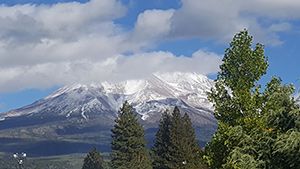Low Tire Pressure In Cold Weather?
Topic 17664 | Page 1
It makes sense that the tire pressure would be lower in singe digit temperatures when the truck and trailer have been sitting all night and I know the pressure will rise as I start driving....but how low is too low? I used to just use a mallet to check the tires but I finally got a tire pressure gauge. The trailer I picked up the other day had only 85-90 psi in all 8 tires. My driver leader (who used to be a driver as well) said I shouldn't air it up since the pressure will increase while I'm driving (again, temperature was in the single digits that day). I believe him, but what happens if I get pulled in for an inspection before the pressure has increased enough? DOT wants the pressure to be at least 100 psi right?
Paul, In believe 100 is Maximum Pressure for trailer tires. I think 85 would be considered "normal" or "fully inflated" for Trailer or Drives. 100 I believe is "fully inflated for steers. I think Swift recommends 100 all of the way around for some "wiggle room" so to speak. That 85-90 in cold weather is more than adequate I would think. I'll bet if it was July, those tires would be in the 90-100 range "cold". There is a bunch of good information on the Web about tire pressure. (some conflicting as well, mostly opinion). Tire Manufacturers websites will be the most accurate.
DOT:
Department Of Transportation
A department of the federal executive branch responsible for the national highways and for railroad and airline safety. It also manages Amtrak, the national railroad system, and the Coast Guard.
State and Federal DOT Officers are responsible for commercial vehicle enforcement. "The truck police" you could call them.
HOS:
Hours Of Service
HOS refers to the logbook hours of service regulations.Forgot to add, I think 110 is Max inflation for steers.

Yeah cold contracts heat expands. But remember when you start rolling the tires hear up cold outside or not.

Yeah cold contracts heat expands. But remember when you start rolling the tires hear up cold outside or not.
Unless your company runs with Nitrogen. Walmart trailers use nitrogen which has almost no thermo reaction properties.

DOT is not going to check for tire pressure, not in California anyway. If it is low, they will document it, but they don't go around check tire pressures. Flat tire yes, low tires in comparison to the others yes, check pressure no way jose. Bank it.
DOT:
Department Of Transportation
A department of the federal executive branch responsible for the national highways and for railroad and airline safety. It also manages Amtrak, the national railroad system, and the Coast Guard.
State and Federal DOT Officers are responsible for commercial vehicle enforcement. "The truck police" you could call them.

It is my opinion that when it gets cold, the air doesn't leave the tires, it simply contracts. If you were looking at it in a volume amount, there is exactly the same amount of air in the tire as before, just pressure is reduced due to cold weather contraction.
That is why you can check tire pressure in the morning when it's cold, and your tires will be down 5 to 10 lbs, and in the afternoon they will be back to 100..without ever having even moved the truck.

Also, I think not all tire gauged are the same. I had one tire gauge that would show my tires to be down about 5 lbs. So I aired them up. That tire gauge broke and I got a new one and now all my tires are between 105 and 110 cold psi.
Also, I think not all tire gauged are the same. I had one tire gauge that would show my tires to be down about 5 lbs. So I aired them up. That tire gauge broke and I got a new one and now all my tires are between 105 and 110 cold psi.
Go to any reputable tire shop and they will have a "Master Gauge" that is supposedly calibrated to be accurate. Check yours against that one and adjust accordingly.

EPU:
Electric Auxiliary Power Units
Electric APUs have started gaining acceptance. These electric APUs use battery packs instead of the diesel engine on traditional APUs as a source of power. The APU's battery pack is charged when the truck is in motion. When the truck is idle, the stored energy in the battery pack is then used to power an air conditioner, heater, and other devices
Keep in mind - you aren't supposed to "air up" hot tires either - tire pressure recommendations are for COLD TIRES. Adding air to a hot tire - isn't going to give you an accurate pressure. Likewise - tires whose pressures are in-spec at operating temps, are probably going to be somewhat low at extreme cold ambient temps.
Car tires (for example) in freezing weather, gain 5-8PSI on TPM systems when they warm up to road temp. Truck tires being that much larger - probably have an even wider variant between cold and operating temps in extremely cold ambient temps.
Tire Pressure Ratings printed on the side of tires usually say MAX on them. Recommended pressures can be found on the door sticker (usually) or are documented by the company safety department.
Rule of thumb for heavy truck tires is 2PSI of pressure for every 10 degree difference in temp.
Interesting article: TireRack Article On Winter Temps & Tire Pressures.
Rick
HOS:
Hours Of Service
HOS refers to the logbook hours of service regulations.New Reply:
New! Check out our help videos for a better understanding of our forum features

















Preview:








 TT On Facebook
TT On Facebook
It makes sense that the tire pressure would be lower in singe digit temperatures when the truck and trailer have been sitting all night and I know the pressure will rise as I start driving....but how low is too low? I used to just use a mallet to check the tires but I finally got a tire pressure gauge. The trailer I picked up the other day had only 85-90 psi in all 8 tires. My driver leader (who used to be a driver as well) said I shouldn't air it up since the pressure will increase while I'm driving (again, temperature was in the single digits that day). I believe him, but what happens if I get pulled in for an inspection before the pressure has increased enough? DOT wants the pressure to be at least 100 psi right?
DOT:
Department Of Transportation
A department of the federal executive branch responsible for the national highways and for railroad and airline safety. It also manages Amtrak, the national railroad system, and the Coast Guard.
State and Federal DOT Officers are responsible for commercial vehicle enforcement. "The truck police" you could call them.